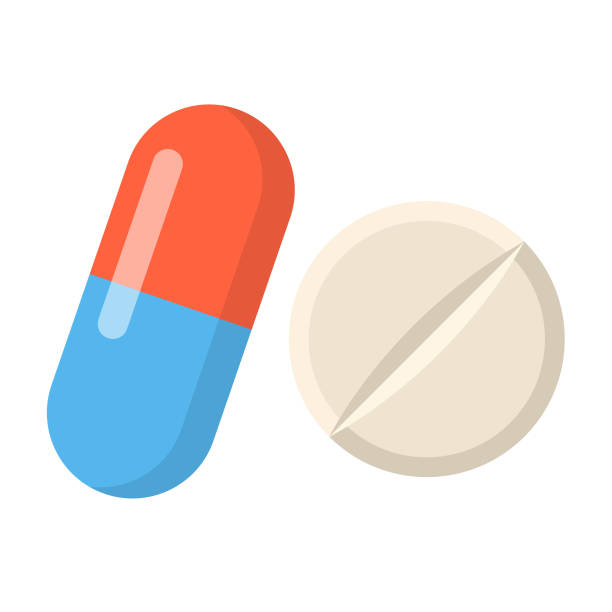Indications
Symptomatic treatment of pain and inflammation of mild or moderate intensity, such as musculo-skeletal pain, menstrual pain, & dental pain
Pharmacology
Dexketoprofen is the S(+)-enantiomer of Ketoprofen and is responsible for the analgesic and anti-inflammatory activity of Ketoprofen. The inactive R(-)-enantiomer does not contribute to the therapeutic properties of Ketoprofen but adds to the metabolic load. Dexketoprofen has been formulated as a trometamol salt. Its high solubility in water means a rapid absorption through the gut wall which results in a more rapid onset of action than Ketoprofen. Peak plasma concentrations are attained more quickly than other widely used analgesics with an onset of action of 30 minutes. Dexketoprofen trometamol, given as a tablet, is rapidly absorbed, with a time to maximum plasma concentration (tmax) of between 0.25 and 0.75 hours, whereas the tmax for the S-enantiomer after the racemic drug, administered as tablets or capsules prepared with the free acid, is between 0.5 and 3 hours. Peak plasma concentrations of 1.4 and 3.1 mg/L are reached after administration of Dexketoprofen trometamol 12.5 and 25 mg, respectively. From 70 to 80% of the administered dose is recovered in the urine during the first 12 hours, mainly as the acyl-glucuronoconjugated parent drug. No R(-)-Ketoprofen is found in the urine after administration of Dexketoprofen [S(+)-Ketoprofen], confirming the absence of bioinversion of the S(+)-enantiomer in humans. The anti-inflammatory potency of Dexketoprofen was always equivalent to that demonstrated by twice the dose of Ketoprofen.
Dosage And Administration
The dose of Dexketoprofen 25 mg tablets depends on the type, severity, and duration of pain. The recommended dose is generally 1 tablet every 8 hours, with no more than 3 tablets daily. The elderly and patients with renal or hepatic impairment should start treatment with a total daily dose of no more than 2 tablets. Normally it is recommended to take the tablets with food. In the case of acute pain, it is recommended that tablets be taken at least 30 minutes before meals. Dexketoprofen is not recommended for children.
Interaction
Any of the following drugs cannot be used at the same time while taking Dexketoprofen. Other non-steroidal anti-inflammatory drugs, anticoagulant medicines; lithium; methotrexate; hydantoins (a type of medicine used for epilepsy) or some antibiotics of sulphonamide type (e.g. sulfamethoxazole); medications used to treat high blood pressure (ACE inhibitors, diuretics and beta-blockers); pentoxifylline; zidovudine; cyclosporine or tacrolimus; some oral medicines for diabetes (sulphonylureas); thrombolytic medicines; probenecid; cardiac glycosides; mifepristone; and quinolone antibiotics.
Contraindications
Dexketoprofen tablets are not recommended to use in patients who are allergic to this product or aspirin or other non-steroidal anti-inflammatory medicines; who have suffered attacks of asthma, bronchospasm, acute rhinitis, nasal polyps, urticaria, angioedema (swollen face, eyes, lips, or tongue, or difficulty in breathing) after taking aspirin or other non-steroidal anti-inflammatory medicines; who have or previously suffered from a peptic ulcer or chronic gastro-intestinal disorders; who had previously gastro-intestinal haemorrhage (bleeding); who have suffered bronchial asthma; who have severe heart failure, moderate to severe renal dysfunction or severely impaired hepatic function; who have a bleeding disorder, a blood clotting disorder or are taking an anticoagulant; and who are pregnant or breast-feeding.
Side Effects
As with all medicines, Dexketoprofen 25 mg tablets may cause some unwanted effects in some patients. These are described below and are characteristic of non-steroidal antiinflammatory drugs:
- Common (1-10%): nausea, vomiting, diarrhoea, stomach pain or heartburn.
- Uncommon (0.1-1%): sleep disorders, nervousness, headache, dizziness, vertigo, palpitations, constipation, dry mouth, flatulence, skin rash, fatigue, hot flushes, shivering, general malaise.
- Rare (0.01 0.1%): stomach ulceration, gastric haemorrhage or perforation; pins and needles, high blood pressure, water retention, slowed breathing rate, hepatic enzymes increased, increased sweating.
- Very rare/isolated cases (<0.01%): blurred vision, ringing in the ear, low blood pressure, haematological reactions, hepatic or renal damage, dermatological and photosensitivity reactions, bronchospasm or anaphylaxis.
- In patients with systemic lupus erythematosus or mixed connective tissue disease, antiinflammatory medicines may rarely cause isolated cases of fever, headache and rigidity of the nape (back of the neck).
Pregnancy And Lactation
The use of Dexketoprofen tablets during pregnancy or breast-feeding is not recommended.
Precautions And Warnings
Precaution should be exercised during using Dexketoprofen tablets in patient who are allergic to any other NSAIDs; who have kidney disease, liver disease, heart disease or fluid retention conditions; and who have blood disorder, systemic lupus erythematosus or mixed connective tissue disease.
Therapeutic Class
Drugs for Osteoarthritis, Drugs used for Rheumatoid Arthritis, Non-steroidal Anti-inflammatory Drugs (NSAIDs)
Use in special populations
Should not be given to children.
Storage Conditions
Store at a cool & dry place protected from light and moisture. Keep out of reach of children.
